Creative Workshop Exercises: Easy and Engaging Activities #3 Discovering Strengths. Using Appreciative Inquiry Discovery Interviews and Strengths Cards to Boost Mood, Self-Awareness and Confidence 



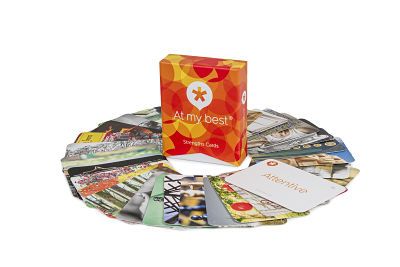
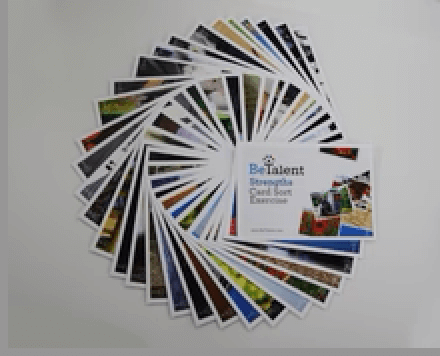
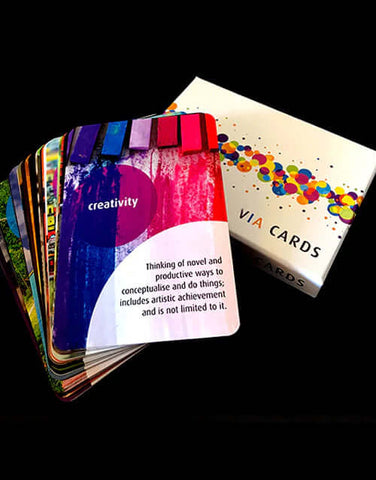
Impact: Increased awareness of strengths and boost to mood and confidence
Materials needed: Positran Strengths Cards, BeTalent Strengths Cards, VIA Strengths Cards or At My Best Strengths Cards or any other strengths cards you may already have
Remember, if you decide to buy a pack you get 10% discount with a newsletter subscription
Professional Use: Coaching, Performance Development or Appraisal, Therapy and Counselling, Consultancy, Training
You can download this blog here
Who is this Discovering Strengths exercise for?
This exercise is designed to help people discover their key strengths through the Appreciative Inquiry discovery interview. The aim of the exercise is to bring each person’s strengths-in-action to light through their sharing of an account of themselves at their best in a particular context. The cards are used to help identify possible strengths, and as stimuli to further discussion and exploration of strengths.
How does the Discovering Strengths exercise help with boosting mood, self-awareness and confidence
The idea of strengths was popularised early this century by Seligman and Peterson. Their research, interpretation and Values-in-Action strengths measurement instantly gained traction and has been extensively researched. Broadly speaking, a knowledge of, and conscious use of personal strengths on a daily or regular basis has been shown to correlate with optimal performance, areas of potential, well-being, levels of engagement, a sense of fulfilment, confidence or efficacy, motivation, authenticity, goal attainment, morale and energy. While an appreciative interview that encourages people to revisit and relive a time when they felt good has been showed to recreate the mood in the moment, so instantly boosting wellbeing.
How to conduct the Discovering Strengths Exercise
The worked example here focussing on working with groups. It should be easy to see how you would adapt the exercise for one-to-one work.
Preparation
- Select a pack of cards to work with. I’m going to use the Positran Strengths Cards in this step-by-step guide.
- Prepare your area of inquiry. This needs to be an area of desired or potential growth. For this example, I am going to use ‘Change Agent Abilities’ as my appreciative topic as it is one I frequently use in practitioner training or development workshops. For more on appreciative inquiry see here, or you might like my book on it, or alternatively search on the web. There’s lots up there.
- Design the interview invitation and process instructions. I generally use something like this
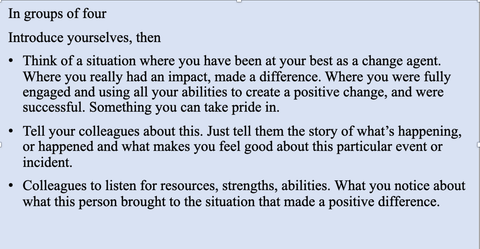
I supplement this instruction with something like ‘It doesn’t have to be something big; it could be a comment you made in a team meeting that changed the direction in a good way, or maybe a passing corridor conversation where you made a change to how someone was feeling about something, or the possibilities they could see in the situation’
And
‘As the listener, encourage the person to tell a rich story. Inquire into who, where, when, how and what to help them go into detail. We want the storyteller to re-enter, relive the experience.’
This is because it is this deep reliving that encourages the emotional state of the past to emerge in the present. You know when it’s working because the tenor of the room changes as people’s mood shifts and lifts. They become more animated, and laughter often breaks out.
If people struggle with the idea of ‘boasting’, or ‘blowing their own trumpet’, you can explain that being fully aware of their inherent strengths means they can maximise their contribution to help others, or the team or the cause. In other words, that it will enable them to be more helpful and useful and to make a greater contribution.
The Exercise
- Arrange people into groups or pairs depending on overall group size. I like 4-6 as it gives some variety in story and in perception of strengths. Of course, it also depends on the time you have.
- Equip each group with a pack of cards
- Issue clear instructions and the feedback health warning (below)
- Everyone to first tell their story, in turn
- Then to spread the strengths cards out
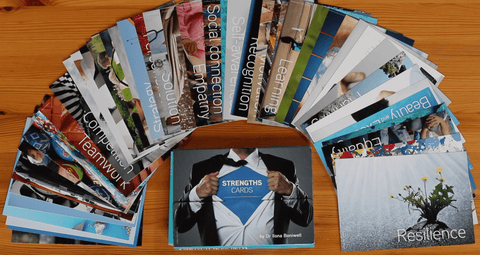
- Then, again in turn, to give each other feedback on the strengths they heard in each other’s story.
- By discussion amongst themselves to pick the top 5-7 strengths to present to the individual receiving feedback and to resist the temptation to say ‘Oh and I saw a bit of this... and some of that...’
- To physically hand the person the card with the strength on it, so they can assemble a collection of strengths cards, reflecting their strengths-in-action
- When they hand over the card to explain ‘We believe you have this strength because of how you....’In other words, to explain the evidence that leads them to believe this person has this strength
- Issue the feedback health warning
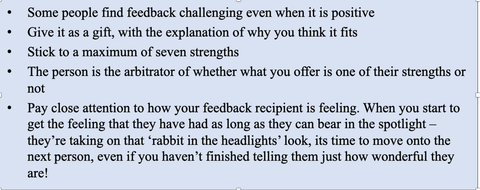
- Encourage a discussion of the feedback, as time permits, making sure everyone gets a feedback turn. Encourage the taking of photos to take away rather than the cards! Remind everyone to return all the cards to the pack ready for the next person’s feedback
- By the end if the exercise you should have a group who have
- Experienced a discovery interview
- Received evidenced feedback of their strengths-in-action as perceived by others
- Have had a chance to refine that against their own perceptions
- And who, if my general experience is anything to go by, are now feeling terrific, have bonded, are in awe of each other’s brilliance and so on. That is, have experienced growth in self-awareness, mood and confidence
- Where you take it from here is really up to you
The strengths card packs featured here are all available at the Positive Psychology Shop. Remember, if you decide to buy a pack you get 10% discount with a newsletter subscription
If you have any queries about the exercises as described, please contact Sarahlewis@acukltd.com. We will publish any queries and answers in the next newsletter to the benefit of all.
Please feel free to share the link to this page with any colleagues you feel may be interested. Or, direct them to the newsletter subscription page where they can find out about the newsletter service and subscribe for free.
Please also feel free to add a link to this blog and/or our shop to your website if you think it might add value to your website visitors.
Many thanks



